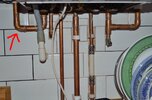Thank you for the replies. I wasn't sure if anybody would still be interested in my little problem, so I would like to present it as a logic problem to solve.
If I run the hot tap only slightly open, after a few seconds the water comes out hot and there are no complaints from the boiler.
If I then open the tap further, after a couple of seconds there is the normal start-up 'whoosh', which then continues as in my video.
I don't know what it is that makes the sound that makes me think of the boiler switching to 'power mode' (all phrases of my own invention), but that sound is totally normal, and I can only guess is similar to what you hear when turning on burners on a gas room heater.
So what is making that thumping sound?
To my ears it doesn't sound like what I'd expect from gas ignition misfiring, but being only a layman I can't rule that out. In any case, after three misfires, wouldn't the boiler cut out as a safety measure?
So what would happen if, when the hot tap was turned on further, after the water still stored in the 'heater tank' (I assume there must be something like in which to heat the water) was exhausted, a partial blockage prevented the water from refilling it to the operating level, so that the smaller volume of water available was over-heating? Would that cause the noise on the video?
I'm rather hoping it is, because cleaning out the ECO-Mag or the canoe filter sounds a lot less drastic than all the other possible actions.
I'd love to offer a prize for the correct solution, but it's cost me enough money already.
If I run the hot tap only slightly open, after a few seconds the water comes out hot and there are no complaints from the boiler.
If I then open the tap further, after a couple of seconds there is the normal start-up 'whoosh', which then continues as in my video.
I don't know what it is that makes the sound that makes me think of the boiler switching to 'power mode' (all phrases of my own invention), but that sound is totally normal, and I can only guess is similar to what you hear when turning on burners on a gas room heater.
So what is making that thumping sound?
To my ears it doesn't sound like what I'd expect from gas ignition misfiring, but being only a layman I can't rule that out. In any case, after three misfires, wouldn't the boiler cut out as a safety measure?
So what would happen if, when the hot tap was turned on further, after the water still stored in the 'heater tank' (I assume there must be something like in which to heat the water) was exhausted, a partial blockage prevented the water from refilling it to the operating level, so that the smaller volume of water available was over-heating? Would that cause the noise on the video?
I'm rather hoping it is, because cleaning out the ECO-Mag or the canoe filter sounds a lot less drastic than all the other possible actions.
I'd love to offer a prize for the correct solution, but it's cost me enough money already.


